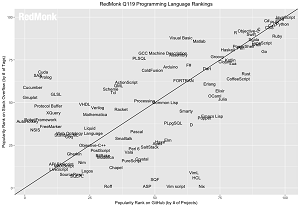News
TypeScript Climbs RedMonk Programming Language Popularity Ladder
RedMonk's lastet programming language popularity report singles out TypeScript as a big mover among an otherwise fairly static ranking of the usual leaders.
The latest report in the firm's biannual cadence -- dated January 2019 but just published March 20 -- noted there's usually very little movement in the rankings of the top 10 or 12 languages. However, as in 2018's end-of-year report, the six-year-old TypeScript was highlighted for its steady climb that sees it jumping up four positions since the June 2018 report.
"When we ran these rankings a year ago at this time, TypeScript had surged into the Top 20 landing at No. 17," the new report says. "It didn't quite match that jump in this run, but movement within the top 20 is much more difficult to accomplish so its four-spot bump is notable for that reason alone.
"It is also notable because by moving up four spots, it finds itself in 12th place, just outside the Top 10 and right behind Swift – the fastest growing language in the history of these rankings."
RedMonk also noted TypeScript's rise in the January 2018 report, along with other Microsoft offerings.
 [Click on image for larger view.] RedMonk Programming Language Rankings: January 2019 (source: RedMonk).
[Click on image for larger view.] RedMonk Programming Language Rankings: January 2019 (source: RedMonk).
In describing that January 2018 report, RedMonk said: "Of all of the vendors represented on this list, Microsoft has by a fair margin the most to crow about. Its ops-oriented language PowerShell continues its steady rise, and R had a bounceback from earlier slight declines. TypeScript, meanwhile, pulled off a contextually impressive three spot jump from No. 17 to No. 14. Given that growth in the top 20 comes at a premium, hitting the ranking that a widespread language like R enjoyed in our last rankings is an impressive achievement."
RedMonk provided more possible reasons for TypeScript's ascension in the report published yesterday (March 20). "The language certainly benefits from its JavaScript proximity, as well as safety features such as the optional static type-checking," it said. "But features alone are never enough by themselves to propel a language this far this quickly -- it must be leveraged by a wide base of growing projects -- all of which explains why TypeScript's trajectory is significant and sustainable."
Here's a comparison of the January 2019 and June 2018 rankings, which allow ties:
| January 2019 |
June 2018 |
| 1 JavaScript |
1 JavaScript |
| 2 Java |
2 Java |
| 3 Python |
3 Python |
| 4 PHP |
4 PHP |
| 5 C# |
5 C# |
| 6 C++ |
6 C++ |
| 7 CSS |
7 CSS |
| 8 Ruby |
8 Ruby |
| 9 C |
9 C |
| 10 Objective-C |
9 Objective-C |
| 11 Swift |
11 Swift |
| 12 TypeScript |
12 Scala |
| 13 Scala |
12 Shell |
| 14 Shell |
14 Go |
| 15 Go |
14 R |
| 15 R |
16 TypeScript |
| 17 PowerShell |
17 PowerShell |
| 18 Perl |
18 Perl |
| 19 Haskell |
19 Haskell |
| 20 Kotlin |
20 Lua |
The RedMonk index ranks languages based on the number of StackOverflow tags and number of GitHub projects, stating: "The idea is not to offer a statistically valid representation of current usage, but rather to correlate language discussion and usage in an effort to extract insights into potential future adoption trends."
About the Author
David Ramel is an editor and writer at Converge 360.